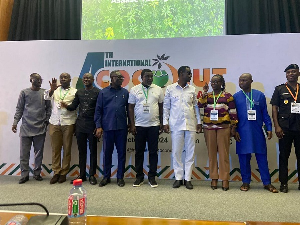A former Deputy Minister of Food and Agriculture, William A. Quaitto has called for the adoption of sustainable practices in coconut farming to build resilience against the growing threat of climate change.
His remarks were delivered during the closing ceremony of the fourth International Coconut Festival in Accra on Monday, October 21, 2024.
The three-day festival, themed “Empowering Lives through Coconut: Innovation, Employment, and Sustainable Livelihoods,” ended on October 23, 2024, and brought together key stakeholders from the coconut sector to explore its economic potential and chart a path toward growth.
Speaking on the economic landscape of coconut farming in Ghana, Quaitto, who also serves as the Chief Executive Officer (CEO) of the Tree Crops Development Authority (TCDA), noted the crop's importance across the nation.
"Coconut thrives along the entire coast of Ghana, stretching to the middle belt and covering 11 out of the 16 regions of the country, translating into 69% of the nation’s land area,” he explained.
He shared that annual production stands at an impressive 504,000 metric tonnes, and while the current yield per hectare is 19.2 metric tonnes, the achievable yield can reach up to 40 metric tonnes.
However, Quaitto cautioned that the sector’s growth could be affected by climate change if resilience-building practices are not prioritised.
"In order for a farmer to be resilient to climate change, they must produce sustainably," he emphasised.
He outlined three pillars of sustainability that are critical to the survival and prosperity of the coconut industry, urging value chain actors to ensure their practices are “environmentally, socially, and economically acceptable.”
He stressed the importance of integrating climate resilience into farming operations, warning that “if we continue with a business-as-usual approach, our farming enterprises will face ruin due to the impacts of climate change.”
He called on coconut farmers and stakeholders to put their practices to the “sustainability test” to help avoid these potentially devastating consequences.
Additionally, Quaitto highlighted the need for awareness among stakeholders regarding climate change and sustainable production practices.
“Awareness creation among all stakeholders on the effect of climate change and sustainable production is key,” he noted, advocating for a re-evaluation of current practices to strengthen any “weak pillars” in farming methods.
He urged farmers to remain mindful of resilience factors so they can respond effectively to climate change impacts.
Meanwhile, the Western Regional Minister, Kwabena Okyere Darko-Mensah, also advised the youth to consider venturing into the coconut industry as a promising avenue for job opportunities.
According to him, the industry offers several prospects, and he encourages young people to explore these opportunities.
"I believe that young people should see opportunities in the coconut industry, whether as farmers, aggregators, or processors. They should find their place in the value chain, and I believe they will thrive," he stated.
Darko-Mensah, who also serves as the Member of Parliament for the Takoradi Constituency, noted, "The coconut festival has opened our eyes to the numerous developments in the industry.
“For example, if you listen to the speakers, especially from the Tree Crop Development Authority, you will realise that we have industries in Ghana that are adding significant value to the coconut sector," the minister said.
On the other hand, the Ghana Export Promotion Authority (GEPA) has reaffirmed its commitment to supporting the country’s burgeoning coconut industry, often referred to as "green gold," through the adoption of innovative technologies aimed at driving economic transformation and creating jobs.
Osafohene Dr. Afua Asabea Asare, the Chief Executive Officer of GEPA, speaking during the opening ceremony on October 21, 2024, emphasized that Ghana's coconut sector holds great potential for job creation and foreign exchange earnings, but its growth requires embracing innovation across the value chain.
“To maintain and expand our presence in the global market, we must adopt modern farming techniques, improved seed varieties, and advanced processing technologies,” Dr. Asabea Asare stated.
She asserted that these innovations are crucial for developing creative products that will ensure the sector’s sustainability and competitiveness.
“Coconut is truly a remarkable crop, often referred to as the ‘tree of life’ because of its versatility across various industries such as food, cosmetics, and pharmaceuticals,” Dr. Asabea Asare noted.
She highlighted that the sector has been prioritized in Ghana’s National Export Development Strategy (NEDS) due to its significant role in job creation, rural development, and poverty reduction.
The CEO also reaffirmed GEPA’s goal of generating at least $25.3 billion in export revenue by 2029 through the NEDS and noted that achieving this target will require deepened collaboration between public and private sector stakeholders.
Dr. Asabea Asare stressed the importance of ensuring the long-term sustainability of the coconut industry.
Kwaku Boateng, Director of the African Coconut Group (ACG), urged young Ghanaians to venture into the coconut industry, citing government interventions such as the Coconut Revitalization Programme and Planting for Export and Rural Development (PERD) as evidence of the state’s commitment to supporting the sector.
“Coconut is a game changer, and the coconut industry alone can employ up to a million Ghanaians because of its well-structured value chain, which includes nursery operators, producers, vendors, processors, and exporters,” he pointed out.
The fourth edition of the International Coconut Festival, co-organized by GEPA, the Western Regional Coordinating Council (WRCC), and the ACG, aims to promote investment in the sector while providing mentorship and networking opportunities for young people and women.
The festival has attracted coconut farmers, policymakers, researchers, and marketers, with exhibitions showcasing a wide variety of coconut products at the Accra International Conference Centre.
Ghana has emerged as Africa’s leading coconut exporter and ranks 12th globally, producing over 500,000 metric tonnes of coconut annually.
In 2022, the country earned $15 billion from coconut exports, with projections to reach $25.3 billion by 2029.
AM/MA
Watch the latest edition of BizHeadlines below:
Click here to follow the GhanaWeb Business WhatsApp channel
Click to view details



Business News of Friday, 25 October 2024
Source: www.ghanaweb.com
Former deputy minister pushes for sustainable coconut farming to tackle climate change
Opinions
















